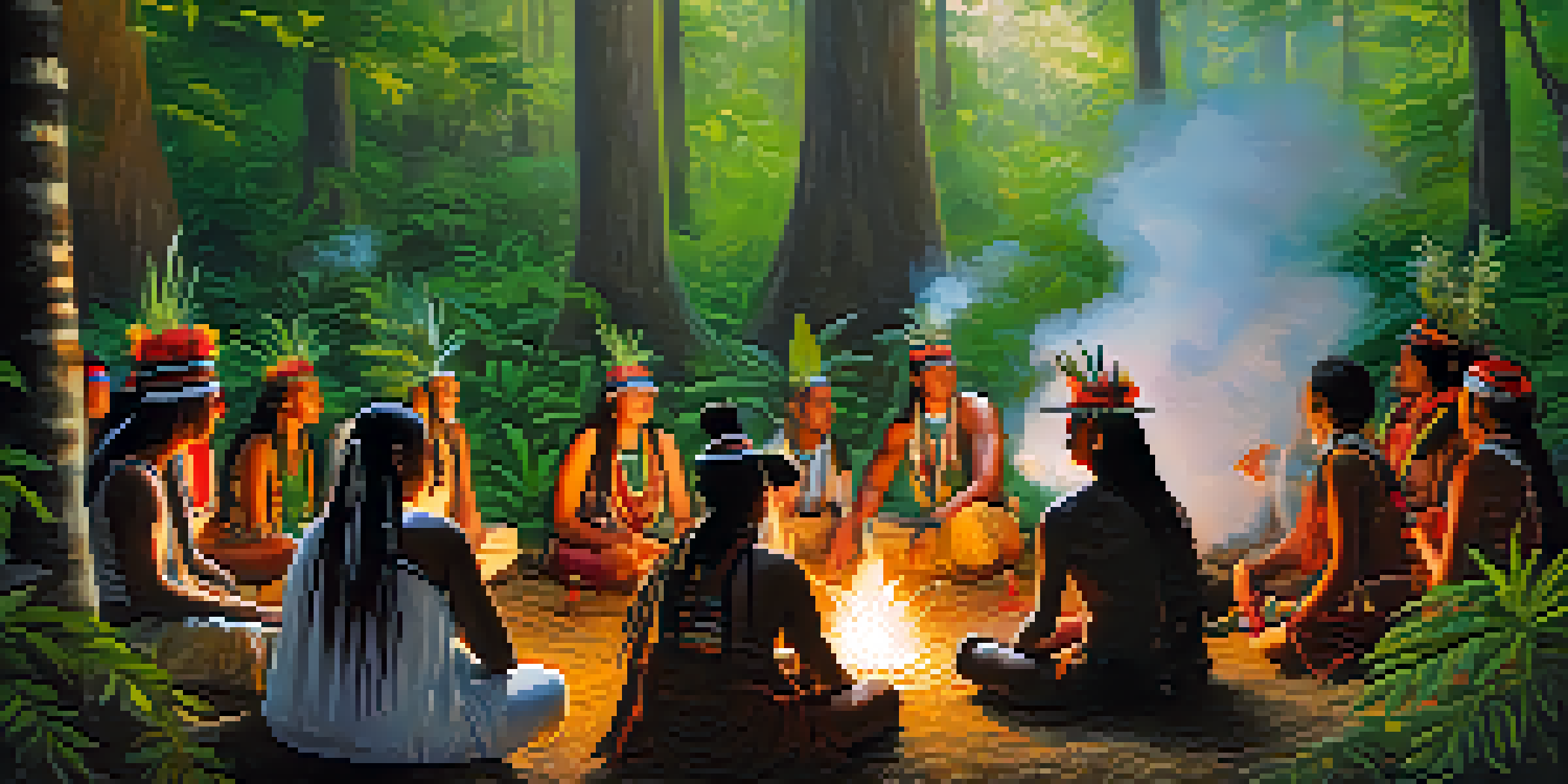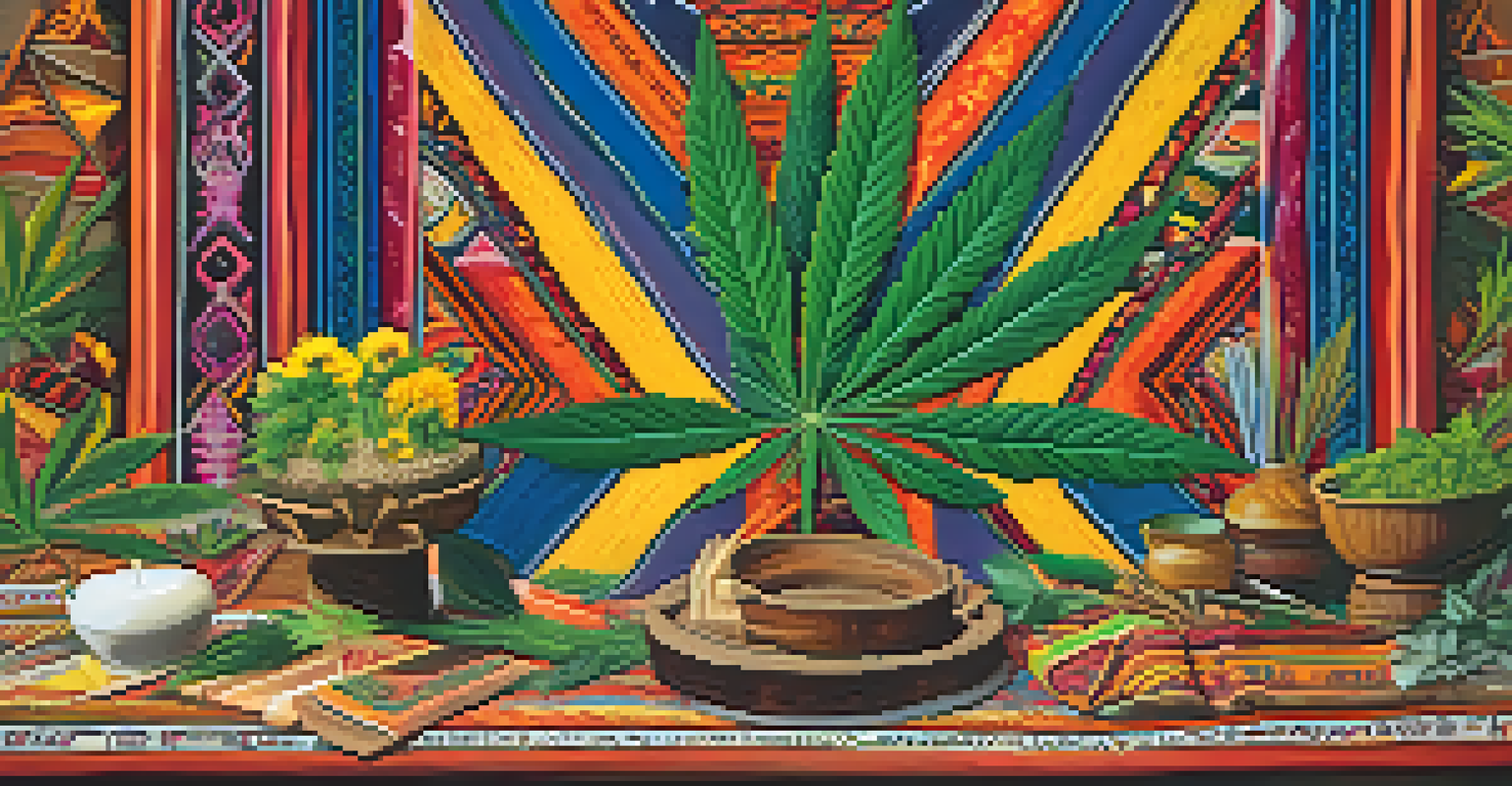Marijuana in Latin America: Ceremonial Uses and Beliefs

Historical Context of Marijuana in Latin America
Marijuana has a long-standing history in Latin America, dating back centuries. Indigenous cultures have used cannabis for various purposes, from medicinal to spiritual. It’s fascinating to think about how these practices have evolved over time, shaping the cultural landscape.
Marijuana is not just a plant; it is a way of life that intertwines with our cultural practices and beliefs.
In many pre-Columbian societies, cannabis was utilized not just for its psychoactive properties but also in rituals and ceremonies. This deep-rooted relationship with the plant reflects a rich tapestry of beliefs and practices. Understanding this historical context provides valuable insights into contemporary uses of marijuana.
Today, the historical significance of marijuana continues to influence modern practices. As societies evolve, traditional beliefs often blend with new understandings, creating unique ceremonial uses that honor the past while adapting to the present.
Ceremonial Uses of Marijuana in Indigenous Rituals
In various indigenous cultures throughout Latin America, marijuana plays a pivotal role in rituals. These ceremonies often focus on healing, connection to the spiritual realm, and community bonding. Participants may smoke or consume cannabis as a means to achieve altered states of consciousness.

For instance, in some Amazonian tribes, marijuana is incorporated into shamanic practices, where it aids in divination and healing. The plant is believed to enhance the shaman's ability to connect with spirits and gain insights. This illustrates how marijuana transcends mere recreational use and becomes a vital tool in spiritual practices.
Historical Roots of Marijuana Use
Marijuana has deep historical significance in Latin America, where it has been used by indigenous cultures for medicinal and spiritual purposes for centuries.
Moreover, these ceremonial uses of marijuana foster a sense of identity and tradition among communities. They serve as a reminder of cultural heritage, reinforcing bonds within the group while passing down knowledge through generations.
Symbolism of Marijuana in Latin American Beliefs
Marijuana is often imbued with deep symbolism in various Latin American cultures. It is frequently seen as a bridge between the physical and spiritual worlds, representing transformation and healing. This symbolic meaning enhances its use in rituals, where it serves as a conduit for spiritual exploration.
In the heart of every tradition lies the power to heal and connect us to something greater than ourselves.
In some beliefs, marijuana embodies the idea of unity with nature. By consuming the plant, individuals feel more connected to the earth and the cosmos, reinforcing the notion of interdependence among all living beings. This perspective is vital in understanding the holistic approach many cultures take towards cannabis.
The symbolism surrounding marijuana can also reflect broader societal values, such as resistance and resilience. In the face of colonial histories and modern challenges, the use of cannabis in ceremonies can be a powerful assertion of cultural identity and autonomy.
Modern Adaptations of Ceremonial Uses
As society shifts, so too do the ceremonial uses of marijuana in Latin America. Many contemporary practitioners are blending traditional rituals with modern practices, creating a unique fusion that appeals to younger generations. This adaptability highlights the plant's ongoing relevance in cultural expressions.
For example, some communities have started integrating cannabis into festivals and public ceremonies, emphasizing celebration and community. These events often attract diverse audiences, fostering dialogue around cannabis use and its cultural significance. It’s a way to educate others while embracing the plant's historical roots.
Ceremonial Significance in Rituals
In various indigenous cultures, marijuana serves as a vital tool in rituals, fostering community bonding and spiritual connections.
This modernization of ceremonial practices also raises questions about commercialization and authenticity. Balancing traditional values with contemporary practices can be challenging but is essential for preserving the integrity of these cultural expressions.
Legal Landscape Influencing Ceremonial Uses
The legal status of marijuana in various Latin American countries significantly impacts its ceremonial uses. As some nations move towards legalization, communities are navigating new opportunities while also facing challenges. This evolving legal landscape prompts a re-examination of traditional practices.
In countries like Uruguay, where marijuana is fully legalized, ceremonial uses can flourish more openly. This shift allows communities to reclaim and celebrate their cultural heritage without fear of legal repercussions. It also opens doors for greater public awareness and acceptance of cannabis in various contexts.
Conversely, in regions where marijuana remains illegal, ceremonial practices may go underground, creating a sense of secrecy and exclusivity. This duality highlights the complex relationship between legality, culture, and the preservation of traditional beliefs surrounding cannabis.
Marijuana and Healing Practices in Latin America
Healing practices involving marijuana have long been a part of Latin American traditions. Many indigenous healers utilize cannabis in conjunction with other natural remedies to treat physical and spiritual ailments. This holistic approach underscores the importance of the mind-body connection in healing.
In various ceremonies, marijuana is used not only to enhance spiritual experiences but also to promote emotional and psychological healing. Participants often report feelings of clarity and connection, making it a valuable tool in therapeutic settings. This aspect of cannabis use reflects a broader trend toward recognizing the psychological benefits of the plant.
Modern Adaptations and Cultural Identity
Contemporary practices are blending traditional marijuana rituals with modern celebrations, highlighting the plant's ongoing relevance in cultural expressions.
As modern medicine begins to acknowledge these traditional healing practices, there is a growing interest in integrating them into contemporary therapeutic approaches. This melding of ancient wisdom with modern techniques can offer a more comprehensive understanding of health and well-being.
Cultural Resilience and the Future of Marijuana Ceremonies
The future of marijuana ceremonies in Latin America is intertwined with cultural resilience. As communities continue to navigate the challenges posed by globalization and changing societal norms, the preservation of traditional practices becomes crucial. Marijuana ceremonies represent more than just rituals; they embody the spirit and identity of the people.
With increasing acceptance and legalization, there is potential for revitalizing these ceremonial practices on a broader scale. Communities can reclaim their heritage and educate others about the cultural significance of marijuana. This resurgence can foster pride and strengthen community bonds.

Ultimately, the journey of marijuana in Latin American culture reflects a dynamic interplay between tradition and modernity. As these ceremonies evolve, they will likely continue to adapt, ensuring that the rich tapestry of beliefs and practices surrounding cannabis remains vibrant and relevant.